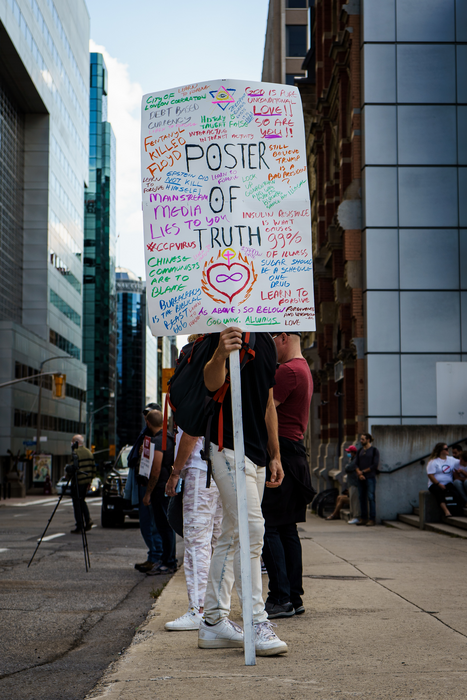To counteract conspiracy beliefs, most–but not all–existing methods …

image: The authors found that preventative measures, such as exposing participants to counterarguments before they encountered misinformation, were the most effective strategies to challenge conspiracy beliefs. view more
Credit: Tom Carnegie, Unsplash, CC0 (https://creativecommons.org/publicdomain/zero/1.0/)
A new review of previously published studies on methods for reducing conspiracy beliefs has shown that most of these methods are ineffective, but that those focused on fostering critical thinking or an analytical mindset show some promise. Cian O’Mahony of University College Cork, Ireland, and colleagues present these findings in the open-access journal PLOS ONE on April 5.
Evidence from prior studies suggests that belief in conspiracy theories can be associated with harmful consequences, such as—in the case of COVID-19 conspiracies—reduced adherence to public health recommendations. In recent years, behavioral researchers have investigated how to reduce conspiracy beliefs. However, until now, no study has comprehensively reviewed existing evidence for the effectiveness of various approaches.
O’Mahony and colleagues conducted a systematic review to analyze 25 previously published studies, with a total of 7,179 participants, that evaluated various approaches for reducing conspiracy beliefs. For example, some studies employed straightforward counterarguments against conspiracy theories, and others used ways of priming participants to have a more analytical mindset before asking them about their conspiracy beliefs.
The analysis showed that, out of all methods in the 25 studies, only half were associated with any change in participants’ conspiracy beliefs, and just a few produced changes of a meaningful size. This suggests that most existing methods for changing conspiracy beliefs are ineffective. Notably, effective interventions tend to be presented to participants before exposure to conspiracy statements, while post-exposure interventions are generally less effective.
The most effective methods were those that drew attention to the factual inaccuracies of conspiracy beliefs prior to presenting participants with conspiracy statements. Another relatively more effective method was a 3-month educational course on differentiating between scientific and pseudoscientific practices. Traditional counterarguments against conspiracy beliefs were some of the least effective methods.
Drawing from their findings, the researchers suggest that future development of methods to counter conspiracy beliefs should focus on fostering critical thinking and an analytical mindset, as well as reaching people before they are exposed to conspiracy theories. They also outline a number of challenges facing such research, such as the need to determine how well different methods might work in the real world outside of a controlled study.
The authors add: “One of the most important findings of our review is that traditional fact-checking and counterarguments are the least effective means of combating conspiracy beliefs. We found that preventative measures, such as exposing participants to counterarguments before they encountered misinformation, were the most effective strategies to challenge conspiracy beliefs. We also found that most interventions would be difficult to implement in real-world settings, which is why we are developing a more viable intervention funded by the Irish Research Council’s Enterprise Partnership with Google in the form of a video game.”
#####
In your coverage please use this URL to provide access to the freely available article in PLOS ONE: https://journals.plos.org/plosone/article?id=10.1371/journal.pone.0280902
Citation: O’Mahony C, Brassil M, Murphy G, Linehan C (2023) The efficacy of interventions in reducing belief in conspiracy theories: A systematic review. PLoS ONE 18(4): e0280902. https://doi.org/10.1371/journal.pone.0280902
Author Countries: Ireland
Funding: Awardee: COM Grant Number: EPSPG/2021/212 Funder: Irish Research Council URL: https://research.ie/. The funders had no role in study design, data collection and analysis, decision to publish, or preparation of the manuscript.
Journal
PLoS ONE
Method of Research
Systematic review
Subject of Research
People
Article Title
The efficacy of interventions in reducing belief in conspiracy theories: A systematic review
Article Publication Date
5-Apr-2023
COI Statement
Google, in association with the Irish Research Council, funded this study, but this does not alter our adherence to PLOS ONE policies on sharing data and materials. There are no patents, products in development or marketed products associated with this research to declare.
Disclaimer: AAAS and EurekAlert! are not responsible for the accuracy of news releases posted to EurekAlert! by contributing institutions or for the use of any information through the EurekAlert system.
This article has been archived for your research. The original version from EurekAlert can be found here.

